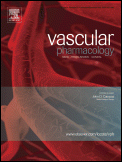Vascular Pharmacology
Vascular Pharmacology is a branch of pharmacology that focuses on the study of pharmacological agents that affect the vascular system, including blood vessels, arteries, and veins. This field encompasses the understanding of how drugs influence vascular tone, blood pressure, and blood flow, as well as the development of new treatments for vascular diseases such as hypertension, atherosclerosis, and aneurysms.
Overview[edit | edit source]
Vascular pharmacology involves the study of endothelial cells that line the blood vessels and the smooth muscle cells that make up the vessel walls. These cells play a crucial role in the regulation of vascular tone and blood pressure. Agents that act on these cells can either cause vasodilation, leading to a decrease in blood pressure, or vasoconstriction, resulting in an increase in blood pressure.
Key Agents in Vascular Pharmacology[edit | edit source]
Several classes of drugs are important in the treatment of vascular diseases, including:
- Antihypertensives: These drugs are used to lower high blood pressure and include several classes such as beta-blockers, ACE inhibitors, angiotensin II receptor blockers (ARBs), calcium channel blockers, and diuretics.
- Anti-atherosclerotic agents: These drugs help reduce the progression of atherosclerosis by lowering lipid levels in the blood, improving endothelial function, or reducing inflammation. Examples include statins, fibrates, and niacin.
- Anticoagulants and antiplatelet agents: These drugs prevent blood clot formation, which is a common complication of vascular diseases. Examples include aspirin, warfarin, and newer agents like dabigatran and rivaroxaban.
- Vasodilators: These drugs, such as nitroglycerin and hydralazine, are used to treat conditions like angina pectoris and heart failure by widening blood vessels and reducing the heart's workload.
Mechanisms of Action[edit | edit source]
The mechanisms by which drugs affect the vascular system are varied and complex. They can act directly on vascular smooth muscle cells or indirectly by altering the function of the nervous system or the balance of hormones that regulate blood pressure and vascular tone. For example, beta-blockers reduce blood pressure by slowing the heart rate and decreasing the force of heart muscle contraction, while ACE inhibitors block the formation of a hormone that causes blood vessels to constrict.
Research and Development[edit | edit source]
Research in vascular pharmacology not only aims to discover new drugs for treating vascular diseases but also to understand the molecular and cellular mechanisms underlying these conditions. This includes studying the genetics of vascular diseases, the role of the immune system in atherosclerosis, and the development of novel therapeutic strategies such as gene therapy and stem cell therapy.
Challenges and Future Directions[edit | edit source]
One of the major challenges in vascular pharmacology is the development of drugs that are effective in treating vascular diseases without causing significant side effects. Additionally, there is a need for personalized medicine approaches that can tailor treatments to individual patients based on their genetic makeup and specific disease characteristics. Future research in vascular pharmacology is likely to focus on these areas, as well as on the exploration of new therapeutic targets and the development of innovative drug delivery systems.
Search WikiMD
Ad.Tired of being Overweight? Try W8MD's physician weight loss program.
Semaglutide (Ozempic / Wegovy and Tirzepatide (Mounjaro / Zepbound) available.
Advertise on WikiMD
|
WikiMD's Wellness Encyclopedia |
| Let Food Be Thy Medicine Medicine Thy Food - Hippocrates |
Translate this page: - East Asian
中文,
日本,
한국어,
South Asian
हिन्दी,
தமிழ்,
తెలుగు,
Urdu,
ಕನ್ನಡ,
Southeast Asian
Indonesian,
Vietnamese,
Thai,
မြန်မာဘာသာ,
বাংলা
European
español,
Deutsch,
français,
Greek,
português do Brasil,
polski,
română,
русский,
Nederlands,
norsk,
svenska,
suomi,
Italian
Middle Eastern & African
عربى,
Turkish,
Persian,
Hebrew,
Afrikaans,
isiZulu,
Kiswahili,
Other
Bulgarian,
Hungarian,
Czech,
Swedish,
മലയാളം,
मराठी,
ਪੰਜਾਬੀ,
ગુજરાતી,
Portuguese,
Ukrainian
Medical Disclaimer: WikiMD is not a substitute for professional medical advice. The information on WikiMD is provided as an information resource only, may be incorrect, outdated or misleading, and is not to be used or relied on for any diagnostic or treatment purposes. Please consult your health care provider before making any healthcare decisions or for guidance about a specific medical condition. WikiMD expressly disclaims responsibility, and shall have no liability, for any damages, loss, injury, or liability whatsoever suffered as a result of your reliance on the information contained in this site. By visiting this site you agree to the foregoing terms and conditions, which may from time to time be changed or supplemented by WikiMD. If you do not agree to the foregoing terms and conditions, you should not enter or use this site. See full disclaimer.
Credits:Most images are courtesy of Wikimedia commons, and templates, categories Wikipedia, licensed under CC BY SA or similar.
Contributors: Prab R. Tumpati, MD

